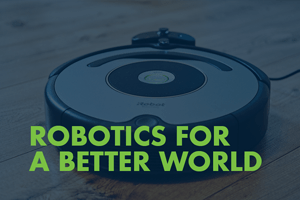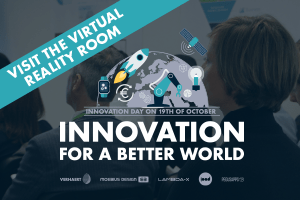New technologies and societal challenges urge us to rethink our business, products, services and processes. Innovation Day 2017 focused on industry transformation. In this interview, Koen Verhaert gives a word of explanation about the theme and Verhaert’s approach to help customers throughout their transformation.
Why did Verhaert choose ‘industry transformation’ as theme for the 14th edition of Innovation Day?
Nowadays everyone has a mouthful of industrial transformation, which is a specific way to innovate: it is a process of change where you want to introduce new products or services to the market. However, a transformation has the specific character to start from an existing context. In innovation in general, you can also start creating from nothing. Just like a start-up.
So, more than innovation it is about evolution.
Indeed but it turns out that we tend to talk about transformation as a consequence of disruptive technologies. Digitalization, for example, to which people look at with great fear, often from a protectionist attitude. Especially at companies who have a running business, who have something to lose. Transformation is than presented as the choice to eat or to be eaten.
Within this perspective technology becomes the source of the problem. This is obviously an important misunderstanding. The technology only enables the disruption, the transformation.
A transformation starts from an existing content. While innovation in general starts from nothing, just like a start-up.
What is the basis of industry transformation?
The starting point is often indeed a disruptive concept. But let’s be a bit more specific on the concept of disruption itself. Disruption is not so much about technology but about the user, the customer, and how we serve their needs.
Industries become a subject to disruption, or have to transform, when they tend to overserve their customers (as a hole or as specific target group) or are not able to make their offering
available to potential target groups. This probably sounds like a failing marketing organization, but that is of course only one part of the truth. It is here that specific technologies can come in as an enabler, pivoting the basis of competition making them so called disruptive technologies.
Therefore we believe that the transformation process starts with user centricity. How to make design thinking a discipline in your organization? How to verify user interest in an early stage? How do you set up a co-creation process? How change behavior and move your customers to your new disruptive offering? User centricity covers different components.
The next step is technology.
Often you have technologies that make disruptions possible. Digital is the big thing of course, but today everything is digital and becomes a container concept for technologies like data sciences, Internet of Things, artificial intelligence, speech recognition, autonomous systems and even 3D printing. Besides their digital component they have one thing in common; their ability to transform your value chain.
Which brings us to the next layer: business models.
Nothing is so difficult as to drastically change your value chain within your existing business. The special thing about those digital technologies? Due to connectivity and software they can be implemented in a gradual way.
You see it for example in the space industry, where gravity of business moves from upstream to downstream applications. Some business cases in the downstream applications become so strong they can afford dedicated space infrastructure. This means they will control the value chain or at least have an important stake in the definition of future space infrastructure. In traditional business environments this takes time. However today we see this process accelerating by the availability of venture capital to support disruptive business ideas.
Disruptive technologies are able to transform your value chain.
The same in the automotive industry: where users are looking for better mobility, changing the nature of competition. New actors are solving those problems. Changing your value chain and go-to market model is often scary but of course represents also a huge opportunity to innovate your business.
To create a transformation, companies need a roadmap.
In different industries, we always see the same model coming back. Initially, the transformation takes place by implementing the aspects of user centricity and new (digital) technologies in an incremental way: to improve existing processes. So you get familiar with the technologies and build your knowledge. It is only when you have the qualities and infrastructure that you begin to modify your business model in a gradual way.
So first, we should manage the two top levels; user centricity and technology properly.
Absolutely. In Industry 4.0 the majority of the applications today are about how to further digitize existing processes to better optimize and control production and logistics. Better known as ‘operational excellence’. While they have much more potential to do radical things.
Can you give us an example?
Take 3D printing or additive manufacturing. The disruptive potential comes in when you move from a central to a distributed production and implement offerings based on mass personalization and late customization. Imagine everyone has a printer at home, download the open source software and start printing your products own. That is the most disruptive thought, undermining the concept of economy of scale and therefore to a certain extend even capitalism… But we are not there yet. Today, people are looking to optimize certain parts by 3D printing: less material, integrated functionalities, complex form factors, light structures, etc. These are more incremental optimizations, making things better.
However by going through that process, you really learn and discover the possibilities and limitations of concrete technologies, in this case 3D printing. Then you can start thinking about how to use it as a platform to transform your business. Are companies ready for it?
After you improved your existing processes successfully with user centricity and new (digital) technologies, you can start thinking to modify your business model in a gradual way.
Are companies ready for it?
Companies are obviously aware of the need to transform. But only a few succeed in cutting down the big challenge in smaller initiatives that you can start implementing today. In the end, the small steps will lead to a large transformation.
Biggest challenge: how to start?
That’s where we come in as Verhaert. To transform from your actual business towards a new reality you need a clear vision. This vision will never become reality but gives a clear direction.
It starts with ‘How can I build the knowledge to improve my current context/business? Again it is initially about user centricity and technology. You can develop that internally or accelerate by
open innovation and co-development.
We advise to focus first on the application of this new knowledge on your actual business. It’s a context that is well known and it generates your revenue and thus the ability to invest in the future. By doing so you prepare your organization to the future. You create your platform and when you’re doing well, you install a Trojan horse.
Once everything in place you tweak your business model, unlocking the real disruptive ability of your platform.
Thank you Koen.





Leave a Reply
Your email is safe with us.